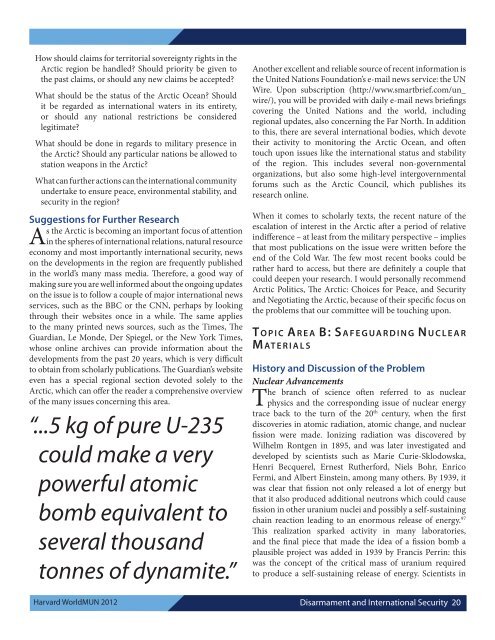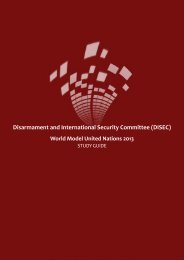Disarmament and International Security - World Model United Nations
Disarmament and International Security - World Model United Nations
Disarmament and International Security - World Model United Nations
You also want an ePaper? Increase the reach of your titles
YUMPU automatically turns print PDFs into web optimized ePapers that Google loves.
How should claims for territorial sovereignty rights in the<br />
Arctic region be h<strong>and</strong>led? Should priority be given to<br />
the past claims, or should any new claims be accepted?<br />
What should be the status of the Arctic Ocean? Should<br />
it be regarded as international waters in its entirety,<br />
or should any national restrictions be considered<br />
legitimate?<br />
What should be done in regards to military presence in<br />
the Arctic? Should any particular nations be allowed to<br />
station weapons in the Arctic?<br />
What can further actions can the international community<br />
undertake to ensure peace, environmental stability, <strong>and</strong><br />
security in the region?<br />
Suggestions for Further Research<br />
As the Arctic is becoming an important focus of attention<br />
in the spheres of international relations, natural resource<br />
economy <strong>and</strong> most importantly international security, news<br />
on the developments in the region are frequently published<br />
in the world’s many mass media. Therefore, a good way of<br />
making sure you are well informed about the ongoing updates<br />
on the issue is to follow a couple of major international news<br />
services, such as the BBC or the CNN, perhaps by looking<br />
through their websites once in a while. The same applies<br />
to the many printed news sources, such as the Times, The<br />
Guardian, Le Monde, Der Spiegel, or the New York Times,<br />
whose online archives can provide information about the<br />
developments from the past 20 years, which is very difficult<br />
to obtain from scholarly publications. The Guardian’s website<br />
even has a special regional section devoted solely to the<br />
Arctic, which can offer the reader a comprehensive overview<br />
of the many issues concerning this area.<br />
“...5 kg of pure U-235<br />
could make a very<br />
powerful atomic<br />
bomb equivalent to<br />
several thous<strong>and</strong><br />
tonnes of dynamite.”<br />
Another excellent <strong>and</strong> reliable source of recent information is<br />
the <strong>United</strong> <strong>Nations</strong> Foundation’s e-mail news service: the UN<br />
Wire. Upon subscription (http://www.smartbrief.com/un_<br />
wire/), you will be provided with daily e-mail news briefings<br />
covering the <strong>United</strong> <strong>Nations</strong> <strong>and</strong> the world, including<br />
regional updates, also concerning the Far North. In addition<br />
to this, there are several international bodies, which devote<br />
their activity to monitoring the Arctic Ocean, <strong>and</strong> often<br />
touch upon issues like the international status <strong>and</strong> stability<br />
of the region. This includes several non-governmental<br />
organizations, but also some high-level intergovernmental<br />
forums such as the Arctic Council, which publishes its<br />
research online.<br />
When it comes to scholarly texts, the recent nature of the<br />
escalation of interest in the Arctic after a period of relative<br />
indifference – at least from the military perspective – implies<br />
that most publications on the issue were written before the<br />
end of the Cold War. The few most recent books could be<br />
rather hard to access, but there are definitely a couple that<br />
could deepen your research. I would personally recommend<br />
Arctic Politics, The Arctic: Choices for Peace, <strong>and</strong> <strong>Security</strong><br />
<strong>and</strong> Negotiating the Arctic, because of their specific focus on<br />
the problems that our committee will be touching upon.<br />
t o p I c A r e A B: s A f e g u A r d I n g n u c l e A r<br />
m At e r I A l s<br />
History <strong>and</strong> Discussion of the Problem<br />
Nuclear Advancements<br />
The branch of science often referred to as nuclear<br />
physics <strong>and</strong> the corresponding issue of nuclear energy<br />
trace back to the turn of the 20th century, when the first<br />
discoveries in atomic radiation, atomic change, <strong>and</strong> nuclear<br />
fission were made. Ionizing radiation was discovered by<br />
Wilhelm Rontgen in 1895, <strong>and</strong> was later investigated <strong>and</strong><br />
developed by scientists such as Marie Curie-Sklodowska,<br />
Henri Becquerel, Ernest Rutherford, Niels Bohr, Enrico<br />
Fermi, <strong>and</strong> Albert Einstein, among many others. By 1939, it<br />
was clear that fission not only released a lot of energy but<br />
that it also produced additional neutrons which could cause<br />
fission in other uranium nuclei <strong>and</strong> possibly a self-sustaining<br />
chain reaction leading to an enormous release of energy. 97<br />
This realization sparked activity in many laboratories,<br />
<strong>and</strong> the final piece that made the idea of a fission bomb a<br />
plausible project was added in 1939 by Francis Perrin: this<br />
was the concept of the critical mass of uranium required<br />
to produce a self-sustaining release of energy. Scientists in<br />
Harvard <strong>World</strong>MUN 2012<br />
<strong>Disarmament</strong> <strong>and</strong> <strong>International</strong> <strong>Security</strong> 20 20

















